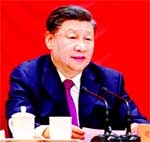
New Nation Report :
Issued in March, a directiveby Chinese government prohibits spouses and children of ministerial-level officials from holding-directly or indirectly-any real estate abroad or shares in entities registered overseas, a report by Wall Street Journal stated in a recent story.
Senior officials and their immediate relatives would also be prohibited from opening accounts with foreign financial institutions unless they had a genuine cause to do so, such as study or job.
Officials must sign pledges certifying their compliance with the new regulations, a requirement that would give Mr. Xi more clout over the political elite ahead of the party’s 20th national congress, which is scheduled for late this year.
Mr. Xi is anticipated to win a third five-year term as party boss at the congress, while also bolstering his leadership bench with more trusted allies in an attempt to cement his position as China’s most powerful leader in decades. The compliance commitments would offer Mr. Xi leverage over any official discovered in violation of the overseas-assets laws, since the guilty cadre would face strong charges of disloyalty and dishonesty to the party.
The directive came as Mr. Xi tries to reduce the Communist Party’s geopolitical risks, citing concerns that officials with overseas financial exposure could become a liability if the US and other Western powers impose sanctions on Chinese leaders and their relatives, similar to what happened after Russia invaded Ukraine, according to the people.
Mr. Xi reminded the party’s main disciplinary agency in January that “leading cadres, especially senior cadres, must pay attention to family discipline and ethics.” “Lead by example in correctly managing their marriages and children, being a dutiful person, and doing things in a clean manner,” he stated.
According to reliable sources, China’s rising tensions with the West have fueled fears that any financial exposure that senior Chinese officials have overseas could be used as leverage against Beijing, especially after seeing how the US and European governments imposed broad sanctions against Russia following its invasion of Ukraine.
In recent years, the United States has placed sanctions on a number of Chinese officials, including blocking any assets they may have in the United States, citing their suspected roles in directing rights violations in Xinjiang’s northern province and suppressing civil liberties in Hong Kong. Wang Chen, a top official in China’s legislature, and Chen Quanguo, the Xinjiang party chairman from 2016 to 2021, were among the 25 members of the party’s Politburo targeted.
Last year, the US president Biden promised to crack down on “criminals, kleptocrats, and others” who paid cash for residences to launder money as part of a larger anti-corruption campaign tied to this week’s United States Summit for Democracy.
Wendy Sherman, the United States’ Deputy Secretary of State, said in April 2021 that she hoped Beijing “learned the right lessons from the Russia-Ukraine crisis,” implying that the West would impose harsh sanctions on China if it used military force against the democratically self-governed island of Taiwan, which Beijing claims as its territory. The possibility of penalties similar to those imposed on Russia would not intimidate China, according to Chinese Vice Foreign Minister Le Yucheng.

